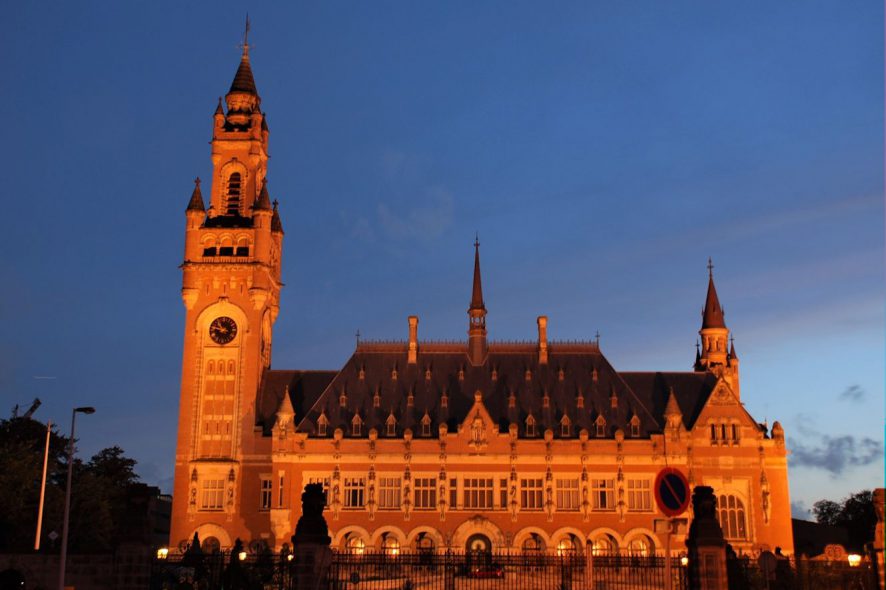International Court of Justice (ICJ), Hague, Netherlands: A 16-Member Bench comprising of President Yusuf; Vice-President Xue; Judges Tomka, Abraham, Bennouna ,Cancado Trindade, Donoghue, Gaja, Sebutinde, Bhandari, Robinson, Crawford, Gevorgian, Salam, Iwasawa; Judge ad hoc Jillani; pronounced the long-awaited verdict of a four day hearing in the Kulbhushan Jadhav Case unanimously with 1 dissenting opinion of the ad hoc Judge Gillani.
The present high-profile case, involving great significance for the Member States, India and Pakistan both, was carried on with keeping in mind the following facts:
Individual named Kulbhushan Sudhir Jadhav has been in the custody of Pakistani authorities. The circumstances of his apprehension remain in dispute between the Parties. According to India, Jadhav was kidnapped from Iran, where he was residing and carrying out business activities after his retirement from the Indian Navy. He was subsequently transferred to Pakistan and detained for interrogation. Pakistan contends that Jadhav, whom it accuses of performing acts of espionage and terrorism on behalf of India, was arrested in Balochistan near the border with Iran after illegally entering Pakistani territory. Pakistan explains that, at the moment of his arrest, Jadhav was in possession of an Indian passport bearing the name “Hussein Mubarak Patel”. India denies these allegations.
India filed an application for the institution of the proceedings on 08-05-2017 against Pakistan on grounds of the alleged violation of the Vienna Convention on Consular Relations by Pakistan pertaining to Kulbhushan Jadhav’s detention and his trial. Jadhav was accused of performing acts of espionage and terrorism on behalf of India and further sentenced to death by a Military Court of Pakistan in 2017. Therefore, India contended that Pakistan breached Article 36 of Vienna Convention:
- By not informing India, without delay, of the detention of Jadhav;
- By not informing Jadhav of his rights under Article 36;
- By denying consular officers of India access to Jadhav
On 18-05-2017, Court indicated the following provisional measures –
“Pakistan shall take all measures at its disposal to ensure that Mr Jadhav is not executed pending the final decision in these proceedings and shall inform the Court of all the measures taken in implementation of the present Order.”
Further, Public Hearings of the said case were held from 18-02-2019 to 21-02-2019, in which India was represented by Deepak Mittal and Harish Salve, while Anwar Mansoor Khan, Khawar Qureshi presented arguments on behalf of Pakistan.
Claims made by India are as follows:
- Relief by way of immediate suspension of death sentence
- Relief by way of restitution in integrum by declaring the sentence of the military court arrived at, in brazen defiance of Vienna Convention rights under Article 36
- Restrain and annul the decision of the Military Court of Pakistan
- If Pakistan fails to annul its decision, then ICJ to declare it illegal and violative of International Law.
The objections placed by Pakistan in regard to the admissibility of India’s application are based on the following:
- Abuse of process
- Abuse of rights
- Unlawful conduct
Court’s Analysis of the facts and contentions placed
ICJ notes that, Pakistan placed contentions in regard to the applicability of certain provisions of the Vienna Convention.
- Pakistan argued that Article 36 of Vienna Convention does not apply in “prima facie cases of espionage”.
- Customary International Law governs cases of espionage in consular relations and allows States to make an exception to provisions on consular access contained in Article 36.
- Pakistan maintains that it is the 2008 Agreement on Consular Access between India and Pakistan rather than Article 36 of the Vienna Convention, which regulates consular access in the present case.
To all the above-stated contentions, Court concluded that the Convention is applicable in the present case, regardless of the allegations that Mr Jadhav was engaged in espionage activities.
Court infers that Pakistan did not inform Jadhav of his rights under Article 36, paragraph 1 (b), of the Vienna Convention, and thus concludes that Pakistan breached its obligation under that provision. In the Court’s view, there is no basis under the Vienna Convention for a State to condition the fulfillment of its obligations under Article 36 on the other State’s compliance with other international law obligations.
Therefore, the Court unanimously decided:
- Application of the Republic of India is admissible.
Further, by a majority of fifteen votes to one, it was decided:
- By not informing Jadhav without delay of his rights under Article 36, paragraph 1 (b), of the Vienna Convention on Consular Relations, Pakistan breached the obligations incumbent upon it under that provision.
- India was deprived of the right to render the assistance provided for by the Vienna Convention to the individual concerned; Pakistan breached the obligations incumbent upon it under Article 36, paragraph 1 (b), of Vienna Convention on Consular Relations.
- Pakistan deprived India the right to communicate with and have access to Jadhav to visit him in detention and arrange legal representation.
- Pakistan is under obligation to inform Jadhav without delay regarding his rights to provide India consular officers access to him in accordance with Article 36 of VCCR.
- Effective review and reconsideration of the conviction and sentence of Jadhav.[India v. Pakistan, General List No. 168, decided on 17-07-2019]







